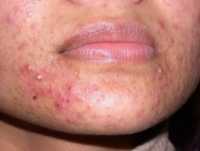
01 May Are Overweight or Obese Adolescents More or Less Prone to Acne?
MedicalResearch.com Interview with:
Igor Snast, MD
Department of Dermatology
Rabin Medical Center–Beilinson Hospita
Israel.
MedicalResearch.com: What is the background for this study? What are the main findings?
Response: Acne is the most common skin disorder among adolescents. Obesity has been suggested to promote acne, however various studies evaluating the relationship between obesity and acne have yielded contradictory outcomes.
Our population-based study demonstrates that overweight, obese and severely obese youths have decreased odds of having acne (20%, 35% and 50% respectively) compared to normal-weight subjects.
MedicalResearch.com: What should readers take away from your report?
Response: In contrast to the common misconception, we found that overweight and obesity are inversely associated with acne in a dose-dependent matter.
MedicalResearch.com: What recommendations do you have for future research as a result of this work?
Response: Our study lacked information regarding possible confounders of the obesity-acneassociation including diet, previous acne treatment, oral contraceptive use and presence of polycystic ovary syndrome. Future studies that include these variables might shed further light on this issue.
Citation:
Acne and Obesity: A Nationwide Study of 600,404 Adolescents
Snast, Igor et al.
Journal of the American Academy of Dermatology , Volume 0 , Issue 0
[wysija_form id=”3″]
[last-modified]
The information on MedicalResearch.com is provided for educational purposes only, and is in no way intended to diagnose, cure, or treat any medical or other condition. Always seek the advice of your physician or other qualified health and ask your doctor any questions you may have regarding a medical condition. In addition to all other limitations and disclaimers in this agreement, service provider and its third party providers disclaim any liability or loss in connection with the content provided on this website.
Last Updated on May 1, 2019 by Marie Benz MD FAAD
